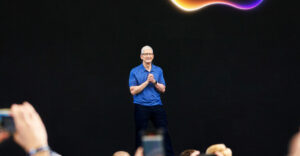
While I was at Microsoft’s Professional Developers Conference last month, I finished Merrill R. Chapman’s book In Search of Stupidity. In the book, from the perspective of an insider, he lays out the mistakes other companies have made to contribute inadvertently to the dominance of Microsoft. While our views differ as to how significant some blunders were in certain cases, in general Chapman does a good job documenting why many of these companies failed and why Microsoft succeeded.
To net it out, companies like Novell and Ashton Tate made incredibly stupid mistakes and, while Microsoft wasn’t perfect, the company’s mistakes (up until the last DOJ trial) were simply not that bad or were quickly corrected. The book is an easy and entertaining read, and I recommend it highly, particularly because I’m seeing a repetition of some of the same avoidable mistakes today.
For instance, the lead attorney on the Microsoft trial, the one who was incredibly effective at tricking Microsoft — especially Bill Gates — into destroying Microsoft’s favorable public image, is now pointed right at the heart of Linux and open-source software and apparently is using the same tactics.
Emotional Decisions = Mistakes
One thing that isn’t spelled out in Chapman’s book but weaves its way through it is that customers often make decisions from the heart and not from the head, abandoning a platform before needing to do so and simply switching from one group of problems to another as a result.
This impulse was very pronounced among several companies I spoke with that had switched from HP to Dell last year. Dell was better in some areas but worse in others, and the net effect was a migration cost that many could have avoided.
I’ve looked at some of the problems associated with the Linux and Apple platforms and have come to the conclusion that neither is necessarily better than Windows — but both are decidedly different. This difference can be problematic for Windows experts because, in switching to a different platform, they likely won’t even know to look for these problems until they can’t be avoided.
No Platform Is Perfect
In looking at the support sites, you can quickly see that neither Linux nor Apple is perfect. For instance, in Apple’s new Panther, the file finder still performs horribly. Also, Firewire drives apparently delete files, there are bugs in the new version of QuickTime, flaws in the security-patch methodology and a general feeling that a new operating system that is mostly bug fixes for the old one should be free. Now, where have I heard that before?
For Linux, I’ve covered its problem issues elsewhere — and I don’t need the barrage of e-mail that would result from covering those problems again here.
The support sites for these operating systems often showcase the “grass is greener” attitude that can cause buyers to skip due diligence and make jumps to new platforms and technologies largely because they believe it can’t be as bad on the other side. Of course, they often find that not only can it be as bad, but it can be worse.
Now, I’m not saying it will always be worse, only that it might be and that it’s a good idea to look first before jumping to another platform.
Client-Server Problems of the 1980s
IT managers adopted client-server technology long before they were ready and did not therefore realize that they needed to understand the shortcomings of these new platforms to avoid bungling the deployments. While it took nearly a decade for people to admit what abysmal failures most of these projects became, the adverse impact on the businesses where they occurred was, at least internally, pronounced and immediate.
With the market recovering, once again we will be able to measure the speed with which one company takes advantage of emerging opportunities and others do not. Just like the IT department that found itself unemployed as a result of an Apple migration, the executive staff is incredibly intolerant of poorly founded critical decisions.
What I’ve also noticed is that the massive buzz — much like it was in the 1980s — emphasizes the benefits of the new and different platform while ignoring the benefits of the existing platform. Meanwhile, the subtext was, and is, that people really were trying to divorce themselves from the entrenched vendor (IBM then, Microsoft now).
Having worked at IBM during that time, I was amazed at how quickly we went from a company that was seen as the safe haven — you never got fired for choosing IBM — to the company that was anything but safe.
Comparing IBM’s Image Problems to Microsoft’s
During my last year at IBM, I spent most of my time researching, mainly through interviews, what had happened to turn IBM from a company that was revered to a company that was hated. It was cathartic for me, and by the time I was done, I’d learned a great deal.
I see a parallel to my experience with IBM in Microsoft, and I have to admit I identify with the folks at Microsoft who are trying to fix that company’s reputation but are getting little credit for their attempt. I had dinner with the head of Microsoft Research during the Professional Developers Conference (PDC) and was reminded just how wonderful some of these folks can be. There is a group of executives at Microsoft who are referred to as “real,” caring more for their employees and for doing what is right than for their careers or their stock options.
What In Search of Stupidity and these PDC experiences reminded me was that Microsoft is unique in that it is a successful company of programmers run by programmers. Even though the company doesn’t believe in the financial benefits of open-source software — and it is in good company — many do believe in the other aspects of the open-source community, including collaboration and code sharing. These people are working to implement policies and develop tools that will enable these activities.
It is clear that Microsoft now understands the security exposures. Granted, that understanding has come a little late, but that’s likely because programmers often focus on cool features and often think security is just something they need to overcome rather than enhance. The company also is listening to customers like never before. However, if all they hear is “you suck,” then they will eventually become jaded and frustrated — much like I was at IBM — by the fact that they get little credit for any positive changes they make.
Companies Are Like People
We form our impressions of companies much as we form impressions of people. The manager we hate at work might actually be a critical defender when our job is put at risk. That nasty cop who writes us a ticket just might have saved the life of a small child at great personal risk the day before. That jerk neighbor next door might be the one person who comes to your aid during a fire or other crisis — a phenomenon a lot of folks here in California discovered recently.
You’ll likely also find — as I did a few years ago — that if you need the company, there is a good chance Microsoft will cover your butt if you’ve built a relationship with the company. I know of no vendor that will cover your butt if you don’t.
I’ve observed or experienced all of this personally, and these experiences, particularly the one with IBM, form the foundation of my suggestion that if you are basing most of your decision to migrate to another platform on a belief that Microsoft — or any vendor, for that matter — is evil, then you should challenge this belief before you make your decision.
Maybe it would be better to try to fix the relationship first. Just because the water looks nice doesn’t mean you should jump right in.
Rob Enderle, a TechNewsWorld columnist, is the Principal Analyst for the Enderle Group, a company founded on the concept of providing a unique perspective on personal technology products and trends.






















































You haven’t used all of these operating systems. You’ve looked for faults with them in the writings of other people. You then selectively put your representation of these faults into a pile and passed judgement on the work of a lot of people dedicated to making something better. Maybe you just had a bad day and your usually constructive intentions went awry. It happens to everyone.
With all due respect:
You sound like a typical windowz user that has never used other operating systems and has obvious slanted opinions that are based on ignorance.
Linux, MAC osX, (UNIX) whether you like it or not is here to stay and flourish regardless of your opinion. I suggest you do further research and you’ll find growing support on a global scale for Linux. As a matter of fact Sun Microsystems has just announced a Common desktop environment that is based on JAVA and Linux that works on existing systems as well as at an enterprise level.
This should open the doors for more development of Linux/JAVA based programs. Sun happens to be the largest contributor of open source programs in the world.
Please see link for further information http://www.sun.com/2003-0930/feature/
This may help you in obtaining factual information instead of biased opinionated remarks.
As a matter of fact a multi-year deal has just been reached with China to provide this desktop environmet to the Government of China. here is further info on the system itself.
http://wwws.sun.com/software/learnabout/javasystem/index.html
It’s scary to think that people like you propagate further misinformation to your readers just because you don’t do your homework.
LINUX/JAVA is here to Stay BABY. Embrace it, aknowledge it, respect it. Stop kissing up to Microsoft and it’s sloppy code.
Windowz has had it’s day, it’s time for an operating system that all can use and and contribute to. GLOBALLY.
69,000 bugs on windowz systems in one year alone. Dude state the facts.
regards
Hunabku
Rob Enderle claims that neither Apple’s prestigious Mac OS X nor the impressive Linux OS are "necessarily better" than Windows. I would have to disagree vehemently.
.
Reason? Viruses and other security exploits. While Linux and Mac OS X are not immune to viruses or exploits, the number of exploits affecting OS X and Linux pale in comparison to Windows exploits. Viruses don’t seem as frequent on Linux distros either. The big difference here regarding viruses is with Mac OS X. While Windows is plagued with over 60,000 viruses there is not one virus that affects Mac OS X. This is remarkable given that Mac OS X is over three years old and has somewhere between 10 and 20 million current users (this number is growing rapidly).
.
Another point to consider regarding *Nix (Linux, *BSD, OS X, AIX, HPUX, Solaris, etc.) is that even if a user gets a virus the entire system is not compromised. The way Unix operates, each user has his/her own separate user directory. If a particular user gets a virus of some sort, no other user is affected, nor is the system compromised. Contrast this to Windows where a virus can and will infect the entire system, including other users’s files.
.
So while Windows XP might have made the experience of using a Wintel box much nicer and more elegant, it is still a cesspool of problems with regard to security and viruses. For that reason alone I could not use any Microsoft product (Outlook and IE are also both plagued with security problems).
.
Lastly, Microsoft has repeatedly stolen other people’s ideas and intellectual property (or when they can’t steal it, they just buy the company outright). They have also strong-armed the competition and OEM companies like Dell, HP, Compaq. For this they were found guilty of breaking Federal Anti-Trust laws and convicted on the charges of being a monopoly. This, coupled with their other problems, are why I switched from being a Windows user (of over a decade, mind you) to being a *BSD (FreeBSD), Linux and Mac OS X user. I’ll never support or give another dime to Microsoft due to their lax security stance, and their business ethics and I encourage others to do the same.
Your contention that essentially all software / OS’s have the same AM ount of bugs is something I here often from Microsoft users.
Well, It’s not true for development or using Apples OSX.
Apple’s Advantage:
– Not at war , or lying about OSSoftware.
– Rich java Development env.
– Great IApp’s / Great Apps: Including MS Office.
– No virii.
– Much better security NOW.
– Great Airport: Router and Firewall, enabled with all services off by default.
Also, you can make the name of your network invisible + password protect your network + plus encrypt your transmissions.
The best thing, for me, is not needing MS Development tools and languages.
Lets’s see, MS dropped support for C++ MFC, Java and VB6. If your multiMillionDollar invenstment in a business solution was in one of these technologies, then YOU have a Needless Zero ROI converting to .NET.
Java has the additional benefit of being 300% more reliable. The only thing that surpasses Sun’s quality is IBM’s mainframe Cobol environment. ( IBM’s C++ software projects don’t match Java’s Quality, IMHO. )
I’ve done the same type of work in Java and MS tech, I’ve once run into a serious bug in Java,
In VB it’s a weekly occurance.
My Question is if MS hires the best then why this junk?
– 80-120 hours per week isn’t good for code quality
– rushed deadlines
– take the easy way out, instead of the long ard way to get it right.
Tip’s for Microsoft:
– review all code that goes into the os and .net
– all code must run thru a debugger
– All IF’s must have an ELSE
– all software must be tested
Until I see that happen, I’ll stick with Sun / Apple and Java.
Rob,
.
I think the word you’re really looking for is "trade-off." As in the phrase, "…should consider the trade-offs."
.
At this point all of the major operating systems – Linux, MacIntosh, and Windows – are able to function at the enterprise level, and each brings with it certain advantages and disadvantages. I’m not sure the issue of support is worth considering – it’s possible to find excellent (or terrible) support for all of these operating systems.
.
As I see it, it goes like this:
.
Windows. There are three disadvantages to this operating system. 1.) Windows is (relatively) unstable. 2.), Windows is massively insecure. 3.) Windows costs more than it’s worth. ($299 for XP when I just downloaded an enterprise grade Linux with a couple hundred useful desktop and server applications for free? C’mon Bill, get real..)
.
At the same time, Windows has two major advantages. 1.) Windows is very common, and everyone knows how to use it. 2.) There are more desktop enterprise level applications available for Windows than for any other system. The difference between what’s available for the Windows desktop vs. what’s available for anyone else is so large it should probably count as two advantages.
.
MacIntosh. This system has two major disadvantages. 1.) The hard and software both cost too much. (Psst!! Steve, I can download BSD for nothing and get most of the advantages of a Mac while paying for PC hardware.) 2.) There aren’t nearly enough enterprise level DESKTOP applications available.
.
MacIntosh computers, however, have five advantages. 1.) Stability. 2.) Ease of use. 3.) All the server-level applications that run on BSD are available. 4.) Much of the code is open and can be inspected for security issues or rewritten to provide extra functionality. 5.) OS-10 runs on BSD Unix, which makes porting an application from Unix or Linux comparatively easy. For example, the newest version of Open-Office is available for free download for MacIntosh. (I suppose one could argue that the availability of good free software makes the MacIntosh superior to Windows from a cost standpoint, but since I’m unwilling to make the initial high investment, I haven’t experimented with the trade off.)
.
Linux: The disadvantages of Linux are as follows. 1.) Less enterprise-level applications on the desktop than either Mac or Windows. 2.) People trained on DOS/Windows systems require retraining before using Linux, even in GUI mode. 3.) The desktop. In this case, I’m not referring to availability of applications or their quality. (The selection is good, though not on the scale of what is available for Windows or Mac, and the quality of most open-source applications is high.) The first Linux GUI problem here is entirely human… The average menu system in a Linux GUI is so crowded with stuff – some important, some not – that it’s almost impossible for a beginner to sort it out. At this point the killer application for Linux would be a desktop configuration tool that carefully quizzed users on their needs and abilities, then configured the menu system. Also, the "clipboard" on Linux is problematic and the X-Windows system doesn’t handle fonts very well. It’s possible to install them, but it’s a major pain. The various GUI problems, taken in total should probably count as two disadvantages.
.
Linux, however, has five advantages. 1.) Stability. 2.) Cost (It’s hard to beat free.) 3.) An immense number of time tested server-level applications – essentially all the usual Unix stuff. 4.) Completely open code all the way from the kernel to the desktop. 5.) A gigantic number of development tools come free with every major distribution.
.
On a personal level, if money was no object, I’d definitely go with the MacIntosh, but since my wallet lives in the real world, I use Linux for my day-to-day work and boot my wife’s Windows box when I need to do something that requires fonts or desktop publishing.
.
On an enterprise level, I’d be inclined to use Linux for the servers, for any application development done in house, and for anyone who didn’t need a special application which was only available in Windows. (Clerical staff, for example, don’t need a six-hundred dollar office suite, and Open Office will read and write MS office file formats.) I’d make Macs available to anyone who needed to do creative stuff on a day-to-day basis, and reserve Windows boxes for those who need to use special tools that don’t run on Linux.
.
Alex
With this type of logic there are no differences between any companies. Your comments are like saying there is no difference between CLI and GUI because you can issue commands in ether.
The fact that all OS’s ship with bugs does not mean there is no difference between them. Also statements like:
>>Panther, the file finder still performs horribly.
>>there are bugs in the new version of QuickTime,
>>flaws in the security-patch methodology
>>a general feeling that a new operating system that is mostly bug fixes
Jade the truth to say the least. Define "performs horribly" I looked through the support area and could find no evidence of a systemic performance problem and saw a large number of raves about performance with panther.
The "bug" in the java implementation of quicktime was had already been patched and the security-patch method was an issue 2 year ago.
As for the "general feeling" people had, it sure does not show from the tech press. Most of these are raving about the value of this upgrade. The only thing I have seen questioning it has been statements about how great Jaguar already was so why upgrade.
Is there a difference in the number of bugs and viruses on different platforms? YES!
OS X and Linux both shine when compared to Windows in this regard. Neither of these OS’s have any major virus problems (where there are new strains every day on windows) and have far fewer security problems than their windows counter parts.
As for your over all assessment of "trying to make it work" with your current vendor, I think that is fine but you are not looking at the other side which is "are people using more expensive inferior products because it is safe". Every problem needs to be evaluated individually. OS X’s licensing agreements are very favorable compared to Windows and it’s tools are great. The G5’s are proving out to be some of the most cost effective CPU’s around so turn the argument around.
Don’t you think people should look at the best tool for the next 2-4 years when buying servers? Even if that might force the individual to learn a new OS? Can Apple, Linux and Windows live happily together?
Diversity has it’s benefits. It is not a goal in and of it’s self but if you can get it with out much "cost" it is worth while and healthy. The computing world is a better place because of both Apple and linux. Without them, Microsoft would not be nearly the company it is today, or the company it may become tomorrow.
True, don’t jump in the deep end. However, you’ve yet again written a mostly unbalenced article here. You critisized Apple and linux but not really microsoft. You just seemed to apologise for them. Take your own advise when it comes to these Linux zealots you seem to hate so much and give them a bit of that understanding you apparently have for everyone else. I’m sure they wouldn’t mind a bit of constructive criticism aslong as you apply it to all platforms in your article. Apple is plagued with problems at the moment. Linux has a way to go before it’s acceptable in the desktop environment but Windows is also riddled with major problems I hope to see fixed or at least improved in Longhorn.
If you write unbalanced, biased and fairly arrogant articles, you’re just asking for retaliation. Like your favored platform, you’ve got some work to do.